Facing the FAQs
By Dr. Mehmet Oz
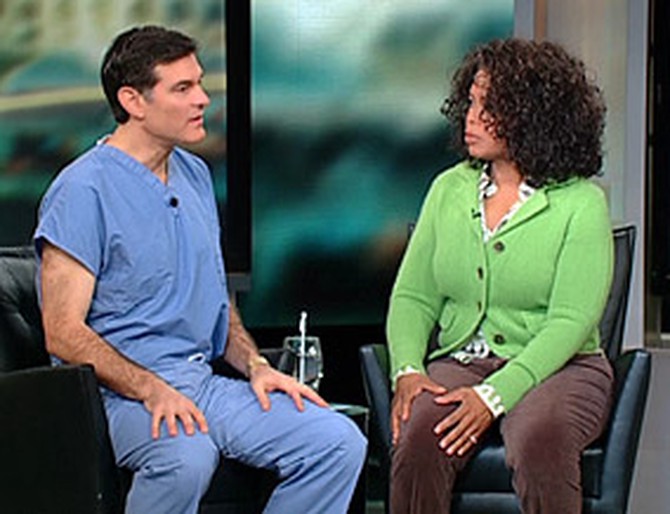
How long does it take food to digest?
Have you ever wondered what happens to the food you eat? First, it passes through the esophagus. It moves by a wave of muscle contractions that squeeze the food down at about two inches per second. When the food reaches the stomach, it falls into a churning pool of digestive juices. In the stomach, the food is broken down into easily absorbable ingredients: proteins, sugars and fats.
Then greenish brown bile produced in the liver is added to help the breakdown of these fats. By the time the food leaves your stomach and passes into the small intestine, it's unrecognizable. The walls of our intestines absorb the nutrients into our blood and that's how we get the energy we all need to live.
How long does this vital process take? It depends on what you're eating, Dr. Oz says. "A steak dinner can take you two, maybe three days to get out of your intestine. What that means is the way you digest it is basically to rot it in your intestines. On the other hand, if you eat vegetables and fruits, they're out of your system in less than 12 hours."
What about chewing gum? Is it true that it takes seven years for it to digest? "No," Dr. Oz says. However, this little urban legend can be a good way to "get kids to stop chewing gum."
Have you ever wondered what happens to the food you eat? First, it passes through the esophagus. It moves by a wave of muscle contractions that squeeze the food down at about two inches per second. When the food reaches the stomach, it falls into a churning pool of digestive juices. In the stomach, the food is broken down into easily absorbable ingredients: proteins, sugars and fats.
Then greenish brown bile produced in the liver is added to help the breakdown of these fats. By the time the food leaves your stomach and passes into the small intestine, it's unrecognizable. The walls of our intestines absorb the nutrients into our blood and that's how we get the energy we all need to live.
How long does this vital process take? It depends on what you're eating, Dr. Oz says. "A steak dinner can take you two, maybe three days to get out of your intestine. What that means is the way you digest it is basically to rot it in your intestines. On the other hand, if you eat vegetables and fruits, they're out of your system in less than 12 hours."
What about chewing gum? Is it true that it takes seven years for it to digest? "No," Dr. Oz says. However, this little urban legend can be a good way to "get kids to stop chewing gum."
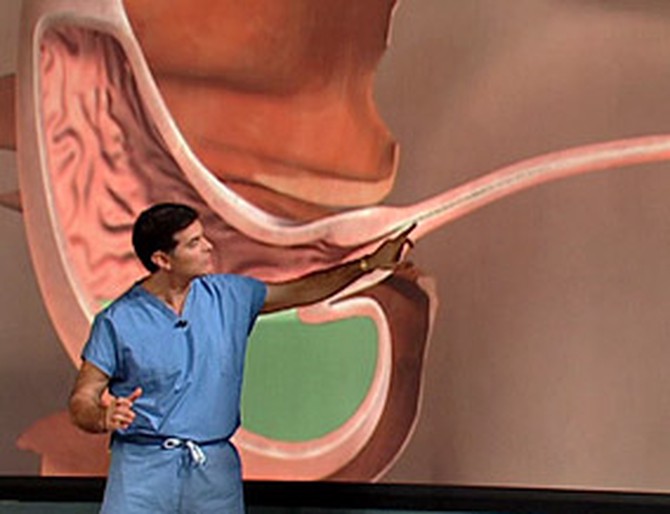
What is heartburn?
A common problem for Americans, heartburn is the opposite of correctly digesting food. "The stomach, instead of pushing food down, pushes it back up into the esophagus," Dr. Oz says.
Heartburn is technically known as gastroesophageal reflux disease, or GERD.
"When you lie on your back, a lot of the acid material in your stomach goes into the swallowing tube called the esophagus," Dr Oz. explains. "Here it actually burns that lining, that's what causes the irritation. It's literally a sunburn of the inside of your esophagus."
A common problem for Americans, heartburn is the opposite of correctly digesting food. "The stomach, instead of pushing food down, pushes it back up into the esophagus," Dr. Oz says.
Heartburn is technically known as gastroesophageal reflux disease, or GERD.
"When you lie on your back, a lot of the acid material in your stomach goes into the swallowing tube called the esophagus," Dr Oz. explains. "Here it actually burns that lining, that's what causes the irritation. It's literally a sunburn of the inside of your esophagus."
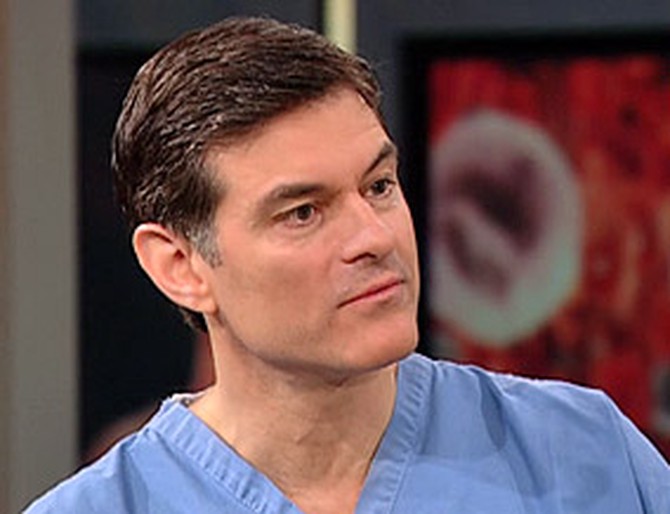
Why is poop brown?
The reason that heartburn, or GERD, is such a problem is that so many people are unaware that they can deal with it. "Our intestinal system provides all kinds of clues," Dr. Oz says. Try investigating the color of your stool. "If you don't have any bile, your poop will turn white. What makes the poop brown is the bile. It's what allows your body to surround fats and absorb them healthily. It's like the soap of our intestines. It hatches to be green. So as it gets metabolized through the bowel, it turns brown."
What could be the cause of red poop? "If you've got red poop, a lot of times that's because you've had beets or red Jell-O," Dr. Oz says. "But red poop can also mean blood. It doesn't take a lot of blood to make it red but if you've got blood in your poop, you've got to get someone to look at you."
The reason that heartburn, or GERD, is such a problem is that so many people are unaware that they can deal with it. "Our intestinal system provides all kinds of clues," Dr. Oz says. Try investigating the color of your stool. "If you don't have any bile, your poop will turn white. What makes the poop brown is the bile. It's what allows your body to surround fats and absorb them healthily. It's like the soap of our intestines. It hatches to be green. So as it gets metabolized through the bowel, it turns brown."
What could be the cause of red poop? "If you've got red poop, a lot of times that's because you've had beets or red Jell-O," Dr. Oz says. "But red poop can also mean blood. It doesn't take a lot of blood to make it red but if you've got blood in your poop, you've got to get someone to look at you."
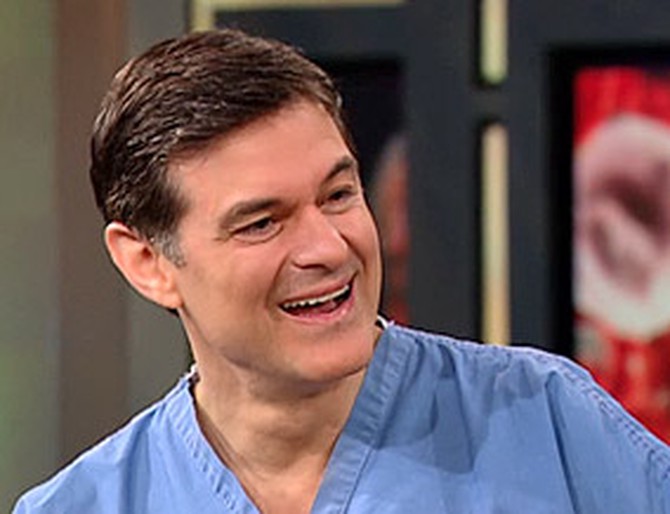
Why does poop smell?
You might want to light a match because Dr. Oz has something to tell you: The origin of poop's odor is sulfur, which smells like a rotten egg.
Many foods contain sulfur. "Eggs are one of them. Cheese—there's a reason they say, 'Don't cut the cheese,'" Dr. Oz says. Other sulfurous foods include meats and vegetables.
You might want to light a match because Dr. Oz has something to tell you: The origin of poop's odor is sulfur, which smells like a rotten egg.
Many foods contain sulfur. "Eggs are one of them. Cheese—there's a reason they say, 'Don't cut the cheese,'" Dr. Oz says. Other sulfurous foods include meats and vegetables.

Why do I get diarrhea?
Holly from Indiana speaks for about 90 million fellow sufferers of this problem. Here's the small and large story about the intestines: Serotonin is the natural chemical in the body that antidepressants affect. Though 5 percent of your body's serotonin is in your brain, 95 percent is in your intestines. "You have a second brain down there," Dr. Oz says. "There are 100 million nerves in that intestine tract. That's the same amount of nerves as you have in your spine."
If your intestines become confused, Dr. Oz says, one effect could be diarrhea, bloating and discomfort from inflammatory bowel disease, or IBS, a very common problem. If you have this problem for more than a day or so, "take chicken soup with some rice because it will help you reabsorb sugar and salt." If you get diarrhea chronically, Dr. Oz says the cause may be food allergies. Some common food allergies include milk products and wheat.
According to Dr. Oz, diarrhea is not necessarily a bad thing. Sometimes, it's just your body's way of protecting itself. "The immune system in your intestines is a very intricate one and it knows when food is not right for you," he says. "So it will tell your body, 'You know what? Get rid of that. We don't want this in us!'"
Holly from Indiana speaks for about 90 million fellow sufferers of this problem. Here's the small and large story about the intestines: Serotonin is the natural chemical in the body that antidepressants affect. Though 5 percent of your body's serotonin is in your brain, 95 percent is in your intestines. "You have a second brain down there," Dr. Oz says. "There are 100 million nerves in that intestine tract. That's the same amount of nerves as you have in your spine."
If your intestines become confused, Dr. Oz says, one effect could be diarrhea, bloating and discomfort from inflammatory bowel disease, or IBS, a very common problem. If you have this problem for more than a day or so, "take chicken soup with some rice because it will help you reabsorb sugar and salt." If you get diarrhea chronically, Dr. Oz says the cause may be food allergies. Some common food allergies include milk products and wheat.
According to Dr. Oz, diarrhea is not necessarily a bad thing. Sometimes, it's just your body's way of protecting itself. "The immune system in your intestines is a very intricate one and it knows when food is not right for you," he says. "So it will tell your body, 'You know what? Get rid of that. We don't want this in us!'"
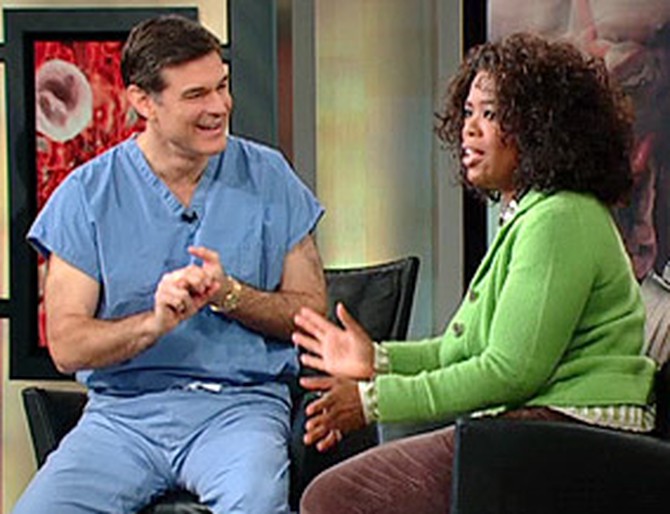
Is there a correct way to wipe in the bathroom?
According to a survey on Oprah.com, 51 percent of respondents wipe front-to-back, 38 percent wipe back-to-front, 10 percent dab…and 1 percent prefer to air dry.
Who's doing it wrong and who's right?
"The dirtiest part of your body is your rectum, or your anus," Dr. Oz says. "So if you go back-to-front, you risk carrying bacteria that aren't supposed to be in your urine up to the front. That's why many women actually get urinary tract infections. All women ought to be dabbing or going from front to back."
"Okay, have we said enough about the subject?" Oprah jokes.
According to a survey on Oprah.com, 51 percent of respondents wipe front-to-back, 38 percent wipe back-to-front, 10 percent dab…and 1 percent prefer to air dry.
Who's doing it wrong and who's right?
"The dirtiest part of your body is your rectum, or your anus," Dr. Oz says. "So if you go back-to-front, you risk carrying bacteria that aren't supposed to be in your urine up to the front. That's why many women actually get urinary tract infections. All women ought to be dabbing or going from front to back."
"Okay, have we said enough about the subject?" Oprah jokes.

What causes burping and farting?
Many of you logged on to Oprah.com and told us your most embarrassing health questions. Thirty-eight percent of you said that gas was a major problem in your lives. On a previous show, Dr. Oz explained that the average person...both men and women...passes gas 14 times a day. What's causing this phenomenal natural gas leak?
"Many of those bacteria that are on your side and protecting you normally will eat up the foods that you're eating and release their waste product: gas, which, by the way, is good for you. You want to have a regular amount of gas. The problem happens when you eat certain foods that give you more gas than you want."
Probably the most infamous gas-producing foods are beans, which, Dr. Oz explains, contain sugar. "In fact, sugars in general are the problem." Bacteria love simple sugars and simple carbohydrates because they're so easy to digest.
Dr. Oz says it's not just what you eat. It's also in the air you breathe. "Twenty percent of the gas comes from the air you take in your mouth," he says. "That comes because you're eating too quickly, you're drinking carbonated beverages, you're chewing gum, you're smoking cigarettes, you're sucking air into your body that gets into your intestines."
Think of your body as a refrigerator, Dr. Oz says. If you let food sit in there, it's going to smell after a while. In your body, sulfur-rich foods like eggs, meat, beer, beans and cauliflower are decomposed by bacteria to release hydrogen sulfide—a smell strong enough to flatten a bear. Avoiding these foods is the ideal solution, but when stinky gas persists, the best solutions are leafy green vegetables and probiotics, specifically lactobacilli GG. These can be found in some yogurts. The product Beano can sometimes work with beans, but soaking the beans ahead of time is useful as well.
Many of you logged on to Oprah.com and told us your most embarrassing health questions. Thirty-eight percent of you said that gas was a major problem in your lives. On a previous show, Dr. Oz explained that the average person...both men and women...passes gas 14 times a day. What's causing this phenomenal natural gas leak?
"Many of those bacteria that are on your side and protecting you normally will eat up the foods that you're eating and release their waste product: gas, which, by the way, is good for you. You want to have a regular amount of gas. The problem happens when you eat certain foods that give you more gas than you want."
Probably the most infamous gas-producing foods are beans, which, Dr. Oz explains, contain sugar. "In fact, sugars in general are the problem." Bacteria love simple sugars and simple carbohydrates because they're so easy to digest.
Dr. Oz says it's not just what you eat. It's also in the air you breathe. "Twenty percent of the gas comes from the air you take in your mouth," he says. "That comes because you're eating too quickly, you're drinking carbonated beverages, you're chewing gum, you're smoking cigarettes, you're sucking air into your body that gets into your intestines."
Think of your body as a refrigerator, Dr. Oz says. If you let food sit in there, it's going to smell after a while. In your body, sulfur-rich foods like eggs, meat, beer, beans and cauliflower are decomposed by bacteria to release hydrogen sulfide—a smell strong enough to flatten a bear. Avoiding these foods is the ideal solution, but when stinky gas persists, the best solutions are leafy green vegetables and probiotics, specifically lactobacilli GG. These can be found in some yogurts. The product Beano can sometimes work with beans, but soaking the beans ahead of time is useful as well.
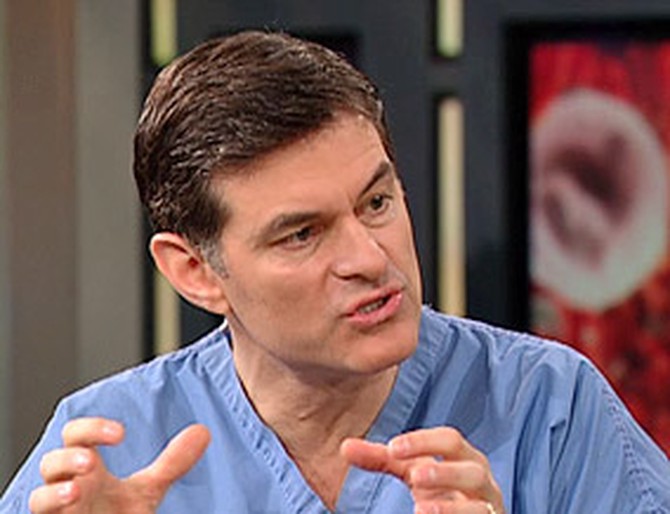
What is sweat good for?
If you listen to commercials, you should never let anyone see you sweat. However, that sweat is very important. "During heavy exercise, your muscles generate enough heat to boil several cups of coffee," Dr. Oz says. Without sweating, "heat would literally cook your internal organs and kill you."
Just below your skin are 3 million sweat glands, each a coiled tube four feet long loaded with liquid. As your body heats up the tubes contract and squeeze a droplet of sweat out onto your skin. As the sweat evaporates, it draws heat away from your body, cooling you.
And, as a special bonus feature, sweat can influence and attract people around you. "The apocrine glands—they're the ones in your armpits and in your genital areas—they actually release chemicals that signal to each other like animals: pheromones. You will instinctively like somebody or not based on their smell," Dr. Oz says.
If you listen to commercials, you should never let anyone see you sweat. However, that sweat is very important. "During heavy exercise, your muscles generate enough heat to boil several cups of coffee," Dr. Oz says. Without sweating, "heat would literally cook your internal organs and kill you."
Just below your skin are 3 million sweat glands, each a coiled tube four feet long loaded with liquid. As your body heats up the tubes contract and squeeze a droplet of sweat out onto your skin. As the sweat evaporates, it draws heat away from your body, cooling you.
And, as a special bonus feature, sweat can influence and attract people around you. "The apocrine glands—they're the ones in your armpits and in your genital areas—they actually release chemicals that signal to each other like animals: pheromones. You will instinctively like somebody or not based on their smell," Dr. Oz says.
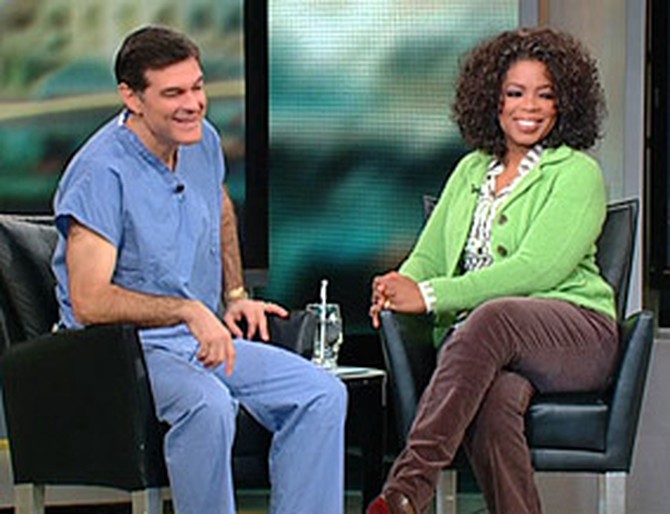
Can sweat be bad?
"First of all, sweat by itself doesn't smell," Dr. Oz says. "What does smell is when the sweat gets bacteria in it. Some people's sweat have chemicals that are particularly attractive to bacteria. Sweat itself comes out normal in its shape and its smell but the bacteria love it, so they just grow and grow and grow and multiply."
A particularly strong smell signals one of two things: diet and bacteria. This smelly sweat may contain some sugar, but sometimes sweat actually inhibits bacteria growth and sometimes it encourages it. Those with particularly smelly sweat may have bacteria already colonized on their body, Dr. Oz says. "Anti-bacterial soaps are sometimes helpful to get those out. In terms of how much you sweat, that varies a lot, and sweat's not a bad thing because it means you're getting rid of some excess energy. That stated, for a lot of Americans it's related to hormonal problems, so thyroid gland issues are of concern."
"First of all, sweat by itself doesn't smell," Dr. Oz says. "What does smell is when the sweat gets bacteria in it. Some people's sweat have chemicals that are particularly attractive to bacteria. Sweat itself comes out normal in its shape and its smell but the bacteria love it, so they just grow and grow and grow and multiply."
A particularly strong smell signals one of two things: diet and bacteria. This smelly sweat may contain some sugar, but sometimes sweat actually inhibits bacteria growth and sometimes it encourages it. Those with particularly smelly sweat may have bacteria already colonized on their body, Dr. Oz says. "Anti-bacterial soaps are sometimes helpful to get those out. In terms of how much you sweat, that varies a lot, and sweat's not a bad thing because it means you're getting rid of some excess energy. That stated, for a lot of Americans it's related to hormonal problems, so thyroid gland issues are of concern."
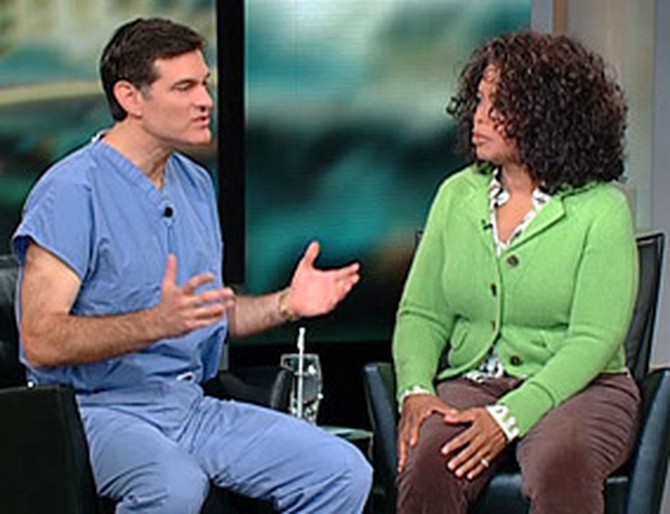
What is earwax?
Are you like the 85 percent of respondents to an Oprah.com poll who said they use cotton swabs to clean their ears? Dr. Oz says you may as well be "taking a muzzle-loader and shoving it in there."
"Wax is the sweat that the body deposits in the ear lining," he says. "When our ancestors were walking along in the sub-Saharan desert, the dust would get caught like an insect trap and prevent it from getting into your eardrum. When you take this cotton swab and you start shoving that wax into your eardrum, you risk not only blocking off the pathway, but you also risk perforating—making a hole—in your eardrum which is just a millimeter thick."
If you have an excessive buildup of earwax and want to get rid of it, Dr. Oz suggests using "a little mineral oil, drop it in there, it will melt it, and it will come out by itself. You don't have to go plunging in there."
So what are you supposed to be using those cotton swabs in your medicine cabinet for anyway? "Taking off makeup," Dr. Oz says.
Are you like the 85 percent of respondents to an Oprah.com poll who said they use cotton swabs to clean their ears? Dr. Oz says you may as well be "taking a muzzle-loader and shoving it in there."
"Wax is the sweat that the body deposits in the ear lining," he says. "When our ancestors were walking along in the sub-Saharan desert, the dust would get caught like an insect trap and prevent it from getting into your eardrum. When you take this cotton swab and you start shoving that wax into your eardrum, you risk not only blocking off the pathway, but you also risk perforating—making a hole—in your eardrum which is just a millimeter thick."
If you have an excessive buildup of earwax and want to get rid of it, Dr. Oz suggests using "a little mineral oil, drop it in there, it will melt it, and it will come out by itself. You don't have to go plunging in there."
So what are you supposed to be using those cotton swabs in your medicine cabinet for anyway? "Taking off makeup," Dr. Oz says.
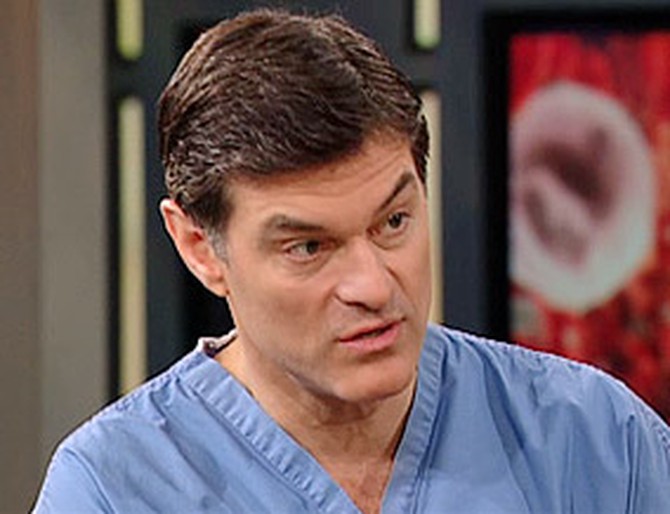
Are all germs dangerous?
Do you buy industrial size bottles of Purell?
Have you continued getting yearly booster shots to prevent cooties?
Are you rubbing antibacterial soap on your hands right now?
Warning: You may find the following information to be extremely disgusting.
Scientists have found:
Despite how utterly revolting this all is, Dr. Oz says, "the vast majority of these germs are not dangerous. In fact, a lot of the secretions, if they're dry, have already lost their ability to hurt you."
"The most dangerous thing we get exposed to is spit," he says. "That's how the flu gets transmitted. It's the way that we're most commonly able to hurt each other. In fact, the human bite is the most dangerous of all animal bites because that's where we actually can hurt each other the most."
So why do we get sick more often in the winter? It's not from going out without a hat and scarf, but because we start to congregate together indoors. "When you sit in a small space with a lot of people and they start coughing on you, that's how viruses get transmitted. That's why we have a flu season in the winter.
Do you buy industrial size bottles of Purell?
Have you continued getting yearly booster shots to prevent cooties?
Are you rubbing antibacterial soap on your hands right now?
Warning: You may find the following information to be extremely disgusting.
Scientists have found:
- bacteria on the handles of doors, the toilet and the towel dispenser of public restrooms
- drool from three different people on an airplane cushion
- saliva from three people on the inside of a bar glass
- germs usually found in feces in the back of a taxi cab
- B. strep, usually found in vaginal secretions, on a movie theater seat. They say it was probably from a woman wearing a short skirt.
- dangerous E. coli bacteria, most likely from fecal matter, on a pair of public headphones
Despite how utterly revolting this all is, Dr. Oz says, "the vast majority of these germs are not dangerous. In fact, a lot of the secretions, if they're dry, have already lost their ability to hurt you."
"The most dangerous thing we get exposed to is spit," he says. "That's how the flu gets transmitted. It's the way that we're most commonly able to hurt each other. In fact, the human bite is the most dangerous of all animal bites because that's where we actually can hurt each other the most."
So why do we get sick more often in the winter? It's not from going out without a hat and scarf, but because we start to congregate together indoors. "When you sit in a small space with a lot of people and they start coughing on you, that's how viruses get transmitted. That's why we have a flu season in the winter.

Can I get an STD from a toilet seat or a hot tub?
One of the most enduring urban legends concerns getting a sexually transmitted disease from a toilet seat or a hot tub. But can that really happen? "Do not worry about the toilet seat," Dr. Oz says. "No one catches STDs on toilet seats."
So what could you get from a toilet seat? "You can theoretically catch some bacteria that can bother your skin," Dr. Oz says, "but toilet seats are a relatively safe place because they're inert, they're just a plastic covering. Here's what the reality is: We're living with bacteria; we're alive because of bacteria; we ought to get comfortable with the fact that we live in a dangerous world and what we really want to do is make sure that our immune systems are ready to do battle. As long as you're able to protect yourself, then you're okay sitting on any toilet seat you want."
Catching something in a hot tub is "more possible…because often the hot tubs aren't kept clean," Dr. Oz says. "People have bodily secretions that they're sweating or leaving in the hot tub and you're hopping right into it. That's a place that I don't like to hang out too much."
One of the most enduring urban legends concerns getting a sexually transmitted disease from a toilet seat or a hot tub. But can that really happen? "Do not worry about the toilet seat," Dr. Oz says. "No one catches STDs on toilet seats."
So what could you get from a toilet seat? "You can theoretically catch some bacteria that can bother your skin," Dr. Oz says, "but toilet seats are a relatively safe place because they're inert, they're just a plastic covering. Here's what the reality is: We're living with bacteria; we're alive because of bacteria; we ought to get comfortable with the fact that we live in a dangerous world and what we really want to do is make sure that our immune systems are ready to do battle. As long as you're able to protect yourself, then you're okay sitting on any toilet seat you want."
Catching something in a hot tub is "more possible…because often the hot tubs aren't kept clean," Dr. Oz says. "People have bodily secretions that they're sweating or leaving in the hot tub and you're hopping right into it. That's a place that I don't like to hang out too much."
Published 01/01/2006

